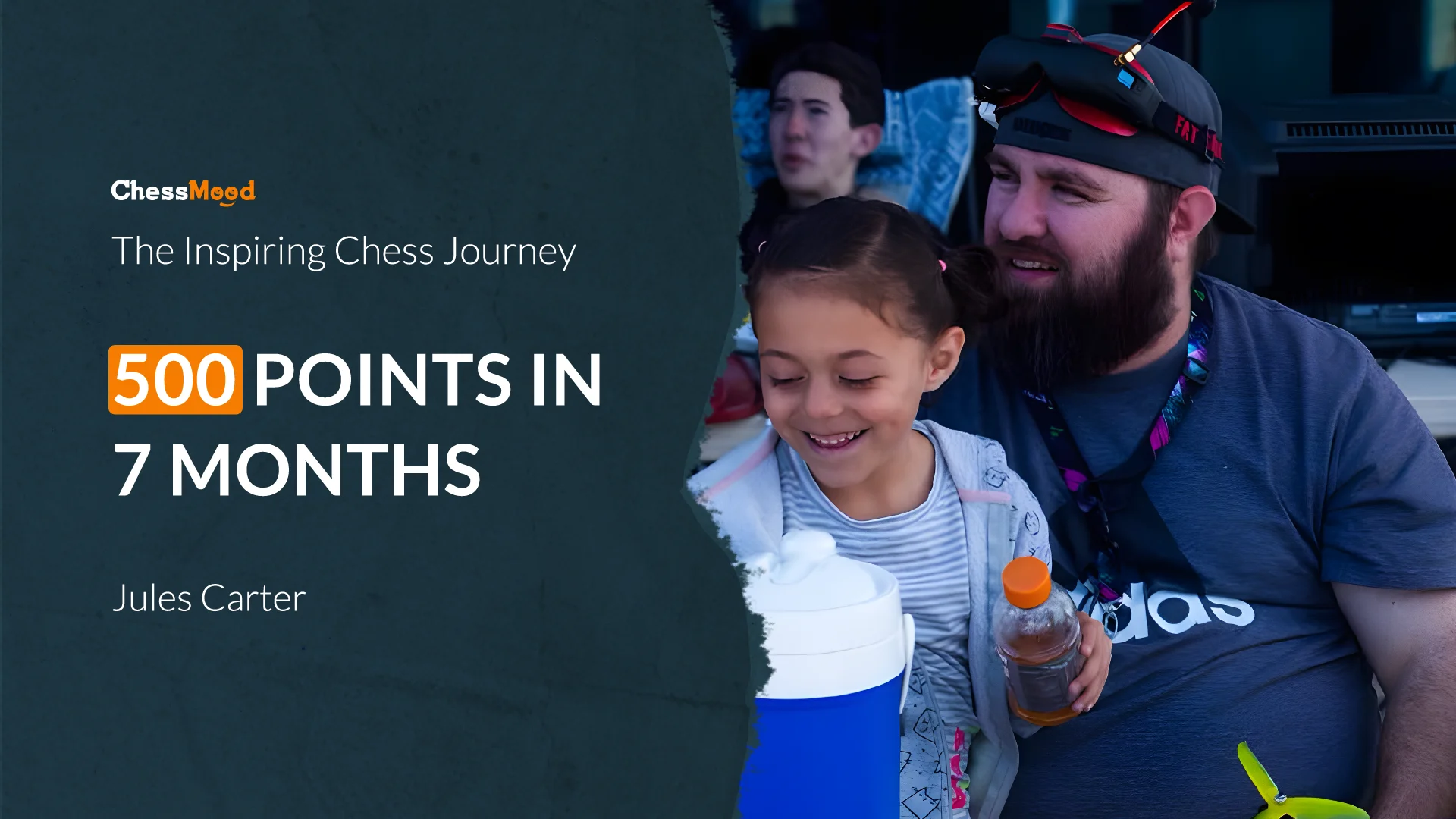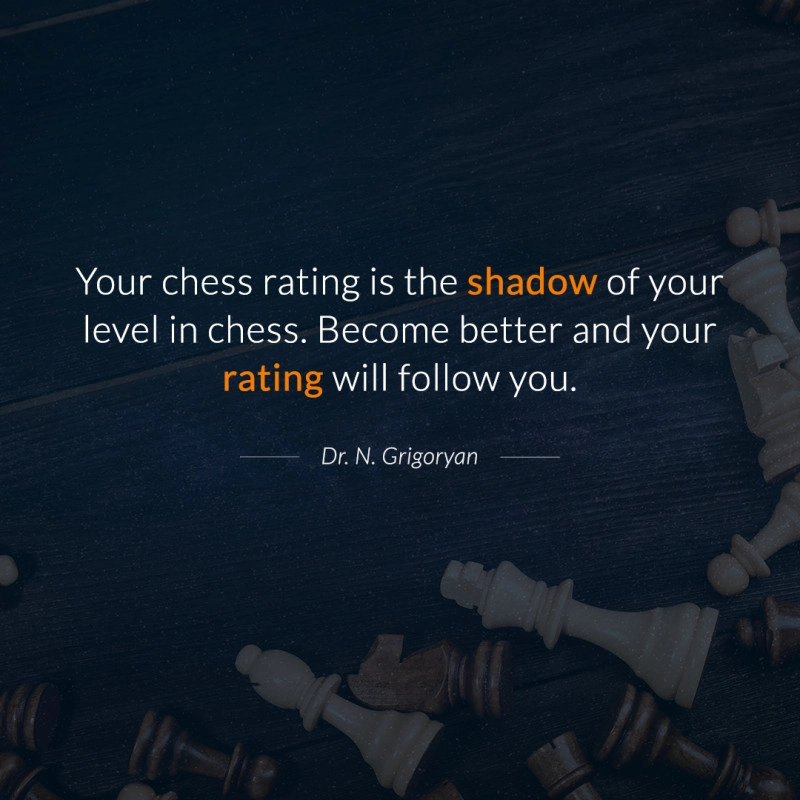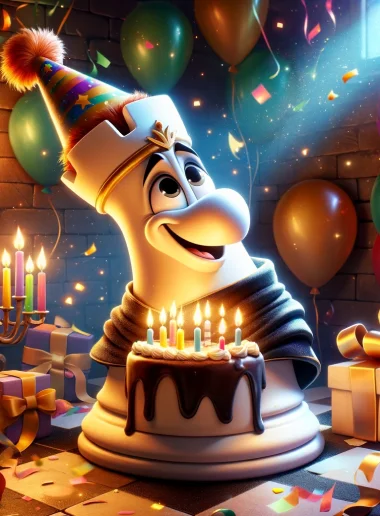500 points in 7 months: The Inspiring Chess Journey of Jules Carter
Learn from the inspiring journey of Jules Carter, who raised 500 points in 7 months. See how he studied chess, fixed mistakes, optimized his environment and more.
Learn from the inspiring journey of Jules Carter, who raised 500 points in 7 months. See how he studied chess, fixed mistakes, optimized his environment and more.

“In 2022, the Magnus Carlsen and Hans Niemann drama was circulating in the news everywhere. So I was like, ‘Oh, yeah chess! Let me get back into this.’”
That’s how Jules Carter, a network and web application security consultant working at NetSPI, reconnected with chess after a 5-year long break.
“I purchased a bunch of courses on Chessable to prepare. And I went to my first tournament in five years and lost about 100 rating points. I had a really horrible performance.”
“Everyone just had rave reviews about Chessmood. So, I told my wife that I'm going to dive headfirst into this and I did.”
Jules became a ChessMood student in December 2022.
“I was doing it by myself for a while. And then I got a coach through ChessMood. He's been a phenomenal addition to my success and my improvement over the last 7 months.”
Jules’s chess coach was Eduard from Tokyo or Edo Tokyo as we call him. Edo’s one of our earliest members, joining us as a student initially in February 2020 and soon he became a main part of our team. Today, he’s our ChessMood ambassador in Japan.

ChessMood ambassador and a sensei to Jules, Edo Tokyo
When he joined in December 2022, Jules was rated around 1736 in Rapid on a different lichess account and had always been around this rating.
On the advice of his coach, he opened a new lichess account with a new name, because the old one was not a winner's name 😄 Then he soon crossed 2200 in June 2023!
“I never thought I could even reach this level. I felt really good and I couldn't have done it without coach, without ChessMood, without the structure, without the right mood.”

Climbing the rating mountain
So how did he go from someone who struggled at a tournament to raising around 500 points in just 7 months?
His story is proof of how one can get better at chess by studying new things, repeating what you learn regularly, fixing your mistakes and having a fighter’s attitude.
“I bought multiple Chessable courses on openings and while I don't have any disrespect for the authors, those courses just didn't help me at all. Those courses are teaching you repetitions of moves without showing you the kind of structures, the middle games you're going to get into. They were unconnected.”
“So I started doing the WhiteMood course and I was like, ‘Oh, this is different’ because not only does Avetik give you the moves, he tells you what’s the plan and shows you games where the plan is executed.”
“Not only that, you have a whole library of games to go through.”
“The Openings in Practice – I've watched those courses like 20 times each! I’ve watched all of Avetik's, all of Gabuzyan's games, with the Whitemood and the Blackmood openings.”

“I'll watch these videos and I'm like ‘Oh, that line right here in this is what Gabuzyan says about playing this position’. So I'll take notes on that. That has really helped with the openings as well as finding the right plan.”
Taking notes, and repeating what he has learned (by rewatching) played a huge role in developing a deep understanding.
“The first over-the-board victory I had with the French attack was so satisfying because it was move for move, everything from a video I watched of Gabuzyan that same morning. A plan worked flawlessly.”
“I was making a lot of really bad blunders, maybe on average 5 a game.”
That came down after working with his coach as you’ll soon discover.
However, even after he was getting bad positions, he wouldn’t lose because he had learned the SLP method.
Jules didn’t just go through the SLP course. Instead, he studied it many times, picking up many subtle nuances.
“It's short, it's sweet and it may seem like you'll go to the SLP course really fast. Trust me, go to that 3 times, 4 times, 5 times. Each time, you're going to pick up something that Avetik says that you didn't get the first or the second time. Take notes.”
The result of all this repetition has paid off extremely well.
“I no longer have stress when I'm in a losing position because the SLP course gives you a guideline of how to play. I feel so much more confident in a losing position. It sounds so silly even coming out of my mouth.”
One of the major reasons behind his blunders was the bad habit of playing extremely fast.
“I'd be playing a 90 min + 30 sec game. At the end of it, I’d have more time on my clock than when I started. I made moves way too quickly, without thinking of the repercussions of those moves.”
But why did he play fast? His coach had made an important discovery:
“Jules likes to play video games. He needs to react fast when playing his action-packed games in front of the computer and he doesn't stop to think a lot. That’s the main reason why he plays very fast. He reacts.”
Jules and his coach came up with a plan to slow him down:
“Coach has me writing down variations on paper during my training. I can't touch the mouse until I have figured out the solution.”
“So if I was doing like 30 problems with the Tactic Ninja quiz, it would take me maybe 10 minutes. Now it's taking me an hour to do 10 problems because I'm writing down all the possible solutions on paper.”
“And I think that has been the biggest step to my improvement because it's made me slow down. It's made me rely on my calculation abilities.”
Initially unlearning all the years of conditioning was hard.
“There are many times when I thought about giving up because I wasn't seeing the results at first.”
“Coach kept telling me to just trust the process. And I did. Then finally I started seeing my results.”

To keep track of training, Jules and his coach use a spreadsheet, which helps them both save time.
“I update the spreadsheet so Edo could see what I'm doing. It's a pretty neat way to get chess coaching.”
“Previously (with another coach) we spent the first like, 15-20 minutes of our session, discussing what we went over. With the spreadsheet, we get straight to business.”

Chess Training Spreadsheet Screenshot | Courtesy: Edo Tokyo
On his journey to raising 500 points in 7 months, he also optimized his environment.
“I try not to do a whole lot of training at my home office because there are a lot of distractions on the computer. I'll go to YouTube. My friends are on Discord.”
Instead, he trains at another place in his house, where there are no distractions.
Many times, the opponent’s rating has a big impact on how we play the game. Jules came up with a smart idea that would allow him to detach from the result, detach from the rating and focus on the game.

“I was playing on lichess exclusively for a while. I had turned off the ‘Show player ratings’.
Find this lichess feature under Profile → Preferences → Display
Because of this setting, he never knows what the rating of his opponent is. A similar feature is also available on chess.com.
“One day, I was just playing, and I realized I've won a lot of games.”
Curious, he decided to check his rating, thinking he was still below 2000. But the reality hit him differently!
“I hit 2200 on lichess and I was like ‘Man, this is insane! It was wild to see I got to my goal.”
***
Your favorite player from the current generation
Magnus Carlsen
Your favorite player from the past generation
Bobby Fischer

The genius | Credits: John Lent
Your favorite ChessMood course
SLP – Saving Lost Positions
What’s the one thing that’s a part of your everyday chess training?
The Daily Lesson with a Grandmaster, the Tactic Ninja quiz and every line of ChessMood opening I’ve studied so far.
Your Right Mood ritual
Solving easy tactics because it gives me confidence. When I'm rapid-firing these tactics, and I'm getting them all right, then I have the confidence. I do it before tournament games. I do it before my practice games.
What’s the best investment you have made in your chess?
ChessMood and coaching with Edo.
What’s the one thing you learned from your coach that has helped you the most?
Take my time. Think about what my opponent is doing on every move. Think about what he's doing first.
Who supported you in this journey?
My wife, kids, and boss were so supportive. It made the process less stressful for me, knowing they had my back.

With his family
What does success in chess look like to you?
Success to me looks like improvement. Not necessarily winning tournaments, but at least improving your understanding of the game.
What’s a life lesson you’ve learned from chess?
Take your time. Slow down. It's a marathon, not a sprint.
What advice would you give to someone who’s thinking of reconnecting with chess, but feels unsure of how to improve?
If you're unsure about what you're going to do and how you're going to improve, just start from the ‘Rating Booster’ courses. Start with Tactic Ninja, start with BlunderProof. Start there if you're going to follow the ChessMood route and if your rating is like 1,000 to 1,500. I mean look at me, use me as an example. Do those two courses and then if you have time, do the SLP course because that course is phenomenal. I can't praise it enough.
Originally published Aug 1, 2023

